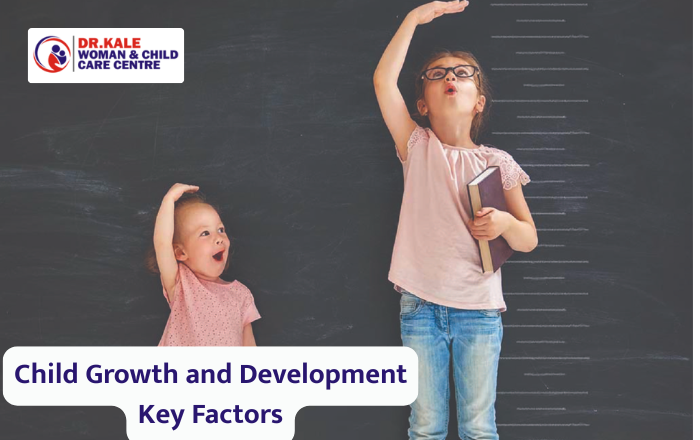Every parent wants to see their child grow healthy and happy, but growth and development in children involve more than just getting taller. From the food they eat to how they play, sleep, and interact with others, many factors influence a child’s physical, emotional, and mental growth. Understanding these factors can help parents support their children in the best way possible. In this article, we’ll explore the key factors affecting child growth and development and practical steps you can take to encourage healthy progress at every stage.
Understanding Child Growth and Development
▸What is Child Growth vs. Development?
Child growth refers to physical changes such as height, weight, and body composition. Development, on the other hand, involves skills like thinking, learning, speaking, and emotional responses. For example, a 2-year-old learning to walk is experiencing growth in motor skills, while learning to communicate with simple words is part of development. Both are interconnected, and delays in one area can sometimes affect the other.
▸ Why Monitoring Development Matters
Keeping track of growth and development helps identify potential issues early. Regular checkups and observing milestones can ensure that children are on the right path. Simple changes in nutrition, activity, or routine can make a big difference if concerns are noticed early.
Key Factors Affecting Growth in Children
▸ Nutrition and Diet
What children eat directly affects their growth. A balanced diet rich in proteins, vitamins, and minerals helps build strong bones, muscles, and a healthy immune system. Foods like eggs, fish, dairy, fresh fruits, vegetables, and whole grains are essential. Poor nutrition can slow growth and affect learning and energy levels.
▸ Genetics and Family History
A child’s height, body type, and certain health traits are often influenced by genetics. While you can’t change genetic makeup, a healthy lifestyle, good nutrition, and regular activity help children reach their full potential within their natural limits.
▸ Physical Activity and Exercise
Active play, running, and sports strengthen muscles and bones and improve coordination. Physical activity also supports brain development and helps children learn teamwork and social skills. Encouraging at least one hour of play or exercise daily is ideal.
▸ Sleep and Rest
Sleep is vital for growth. Growth hormones are released while children sleep, so adequate rest supports physical development. Toddlers need around 11–14 hours, while school-aged children usually need 9–11 hours of sleep daily. Poor sleep can affect attention, mood, and even immunity.
▸Emotional and Social Environment
Children thrive in an environment where they feel safe, loved, and supported. Positive interactions with parents, siblings, and peers help children develop social skills, confidence, and emotional resilience. Stress, neglect, or lack of attention can slow certain areas of development, even if other factors like nutrition are good.
Common Challenges in Child Development
Malnutrition or Poor Diet – Can cause slow growth, low energy, and learning difficulties.
- Developmental Delays or Disorders – Some children may take longer to reach milestones, which can include speech, walking, or social skills.
- Lack of Emotional Support or Stress – Children exposed to stress or a lack of parental attention may struggle with confidence, learning, or behavior.
Parents should observe their child and seek guidance if they notice delays in physical growth, speech, social interaction, or learning.
Tips to Support Healthy Growth and Development
- Provide a balanced diet and encourage healthy eating habits.
- Ensure children get enough sleep and rest.
- Encourage daily physical activity and outdoor play.
- Spend quality time with your child to support emotional and social growth.
- Watch for signs of delays and consult a child development center if needed.
FAQ
Q1: What are the main stages of child development?
Children progress through multiple stages: infancy (0–1 year), toddlerhood (1–3 years), early childhood (3–6 years), middle childhood (6–12 years), and adolescence (12–18 years). Each stage has specific physical, cognitive, and emotional milestones.
Q2: When should I be concerned about my child’s growth?
If your child is significantly below growth charts, not meeting developmental milestones, or shows persistent delays in speech, walking, or social skills, it’s important to seek guidance.
Q3: What foods help promote healthy growth?
Include proteins like eggs, meat, and beans; calcium-rich foods like milk and yogurt; fruits and vegetables; and whole grains for steady energy.
Ensure Healthy Growth and Development for Your Child
If you have concerns about your child’s growth or developmental progress, don’t wait. Early assessment can identify issues that respond well to timely support.
For families in Moshi seeking trusted child healthcare:
Dr. Kale Women And Child Care Centre, a trusted Child Development Center in Moshi, provides complete pediatric services with a focus on child development and growth monitoring. Dr. Mandar Kale brings dedicated expertise in child health, offering guidance and support to help children reach their full growth and developmental potential.
✓ Developmental assessments and milestone tracking
✓ Growth monitoring and nutrition counseling
✓ Vaccination schedules and preventive care
✓ Early detection and intervention programs
✓ Family-centered care approach
Your child’s early years lay the foundation for their entire life. Get the support and guidance you need to help them thrive.
📞 Schedule a consultation today for your child’s health and development needs.


